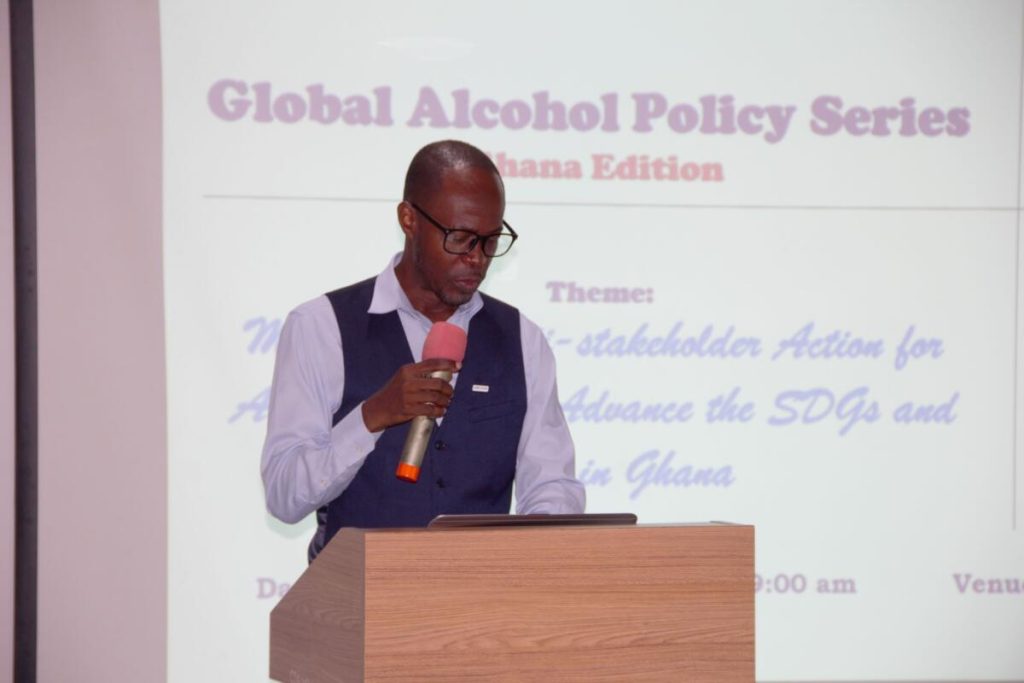By Albert Allotey
Accra, Aug. 9, GNA – The Vision for Alternative Development (VALD-Ghana), a civil society organisation has held the Ghana’s edition of the Global Alcohol Policy Series to rally stakeholders’ support for the adoption of the National Alcohol Policy for sustainable development.
The lack of alcohol regulations has been identified as a contributing factor to the slow progress of the Universal Health Coverage (UHC) and the Sustainable Development Goals (SDGs) and therefore there is an urgent national action to be taken to curb the situation.
The theme of the event was: “Mobilizing Multi-Stakeholders’ Action for Alcohol Control to Advance the SDGs in Ghana.” The programme was also aimed at preparing ahead of the UN High-Level Meeting on UHC 2023.

It was sponsored by Movendi International, the world largest alcohol control organisation and supported by the Mental Health Authority (MHA), Foods and Drugs Authority (FDA) and the World Health Organisation (WHO) Ghana.
The Global Alcohol Policy Series is being held by countries to push for alcohol regulations to control the consumption of the product, which had been thwarting efforts in achieving 14 out of the 17 SDGs.
Mrs Olivia Agyekumwaa Boateng, the Head, Tobacco and Substances of Abuse Department of the FDA in a speech said Ghana had drafted an Alcohol Regulations.
She said the drafting was led by the Ministry of Health in consultation with key stakeholders such as the Ministry of Justice and Attorney-General, MHA, WHO, the Ghana NCD Alliance, VALD, GhanAPA, among others.
She said the new areas in the draft regulation was seeking to address licensing and issuance of permits for facilities; provision of health warnings on the product labels, introduction of harm reduction programmes; and creating of a specific unit within the FDA.
Mrs Boateng said; “The FDA’s ongoing efforts in alcohol regulation included but not limited to registration of alcoholic beverages, restrictions on advertisements and marketing and the minimum legal age restrictions.
“Although countries across the globe have challenges in addressing and achieving the SGD targets, this meeting’s objectives, I believe, would help address the health challenges we are envisaging. A dedicated national commitment, investment, and coordinated actions could easily increase regulatory and enforcement capacity,” she stated.
She said 80 per cent of ‘premature’ NCD deaths occurred in low- and middle-income countries (LMICs) like Ghana, adding that; “The rate of increase of NCD prevalence in LMICs is markedly pronounced, with development transitions contributing to increased exposure to risk factors for NCDs. Alcohol use is a key modifiable risk factor for multiple preventable NCDs.
The above data is alarming and indicates the need for an increased action on alcohol control and other major risk factors like tobacco, sugar sweetened beverages among others, she stated, adding
that cost-effective interventions and policy options for reducing alcohol-related NCD burden were key in achieving the primary objectives of the UHC.
Alhaji Dr Inua I. Yusuf, Head, Legal Affairs, Ministry of Health and a Senior Specialist Pharmacist, Ghana Health Service took participants through the 51-point drafted regulations, which he said conformed with the Constitution of Ghana.
Madam Kristina Sperkova, the President of Movendi International said the organisation was assisting countries to push for alcohol policies to enable them to overcome the socio-economic challenges caused by alcohol use.
She commended the VALD for putting the multi-stakeholders’ meeting together to mobilise all shields of ideas on board to advance alcohol control regulations in the country.
Mr Labram M. Musah, the Executive Director of VALD-Ghana and a Board Member of Movendi International made a presentation on Ghana’s journey on alcohol regulation titled: “The Challenges and Opportunities for Achieving SDGs and UHC – Civil Society Perspective.”
He said the rising rate of alcohol consumption in Ghana and the obvious tobacco control successes have made alcohol policy gained a lot of traction in the past few years, stating however that the journey had not been a straightforward one.
He mentioned industry’s interference in the alcohol policy journey with arguments like legislation is not needed, a voluntary policy will work instead, drinking restrictions violate businesses’ right to property and their right to commerce, alcohol laws will result in more drinking and the rest.
Mr Musah stated however that there were successes in Ghana’s alcohol policy journey through coalition building, adoption of a National Alcohol Policy, restriction on alcohol advertisement on TV and radio from 0600 hours to 200 hours (internet, social media) – using the exposure of kinds and young people as key basis, which had led to the current drafting of the National Alcohol Regulation.
In a group discussion, the media was called upon to help drum home the harmful effect of the consumption of alcoholic beverages to lend public support for the adoption of the alcohol policies to reduce the socio-economic effect of the product.
GNA